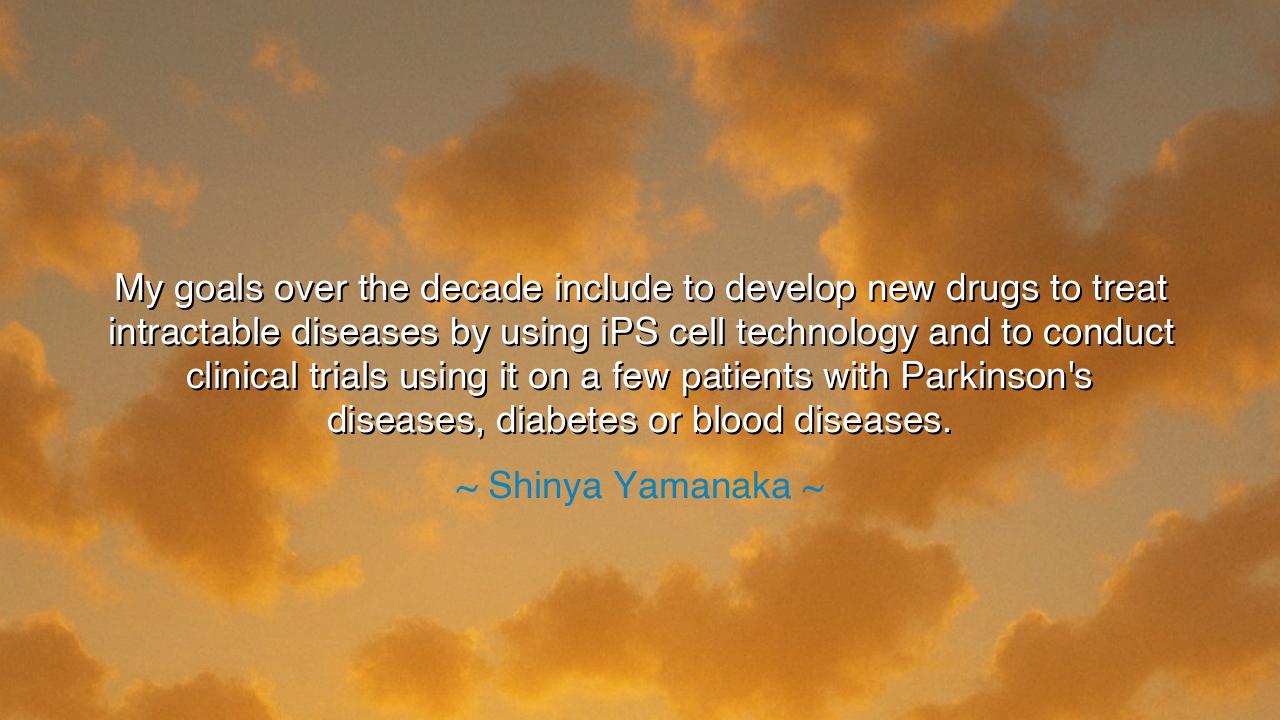
My goals over the decade include to develop new drugs to treat
My goals over the decade include to develop new drugs to treat intractable diseases by using iPS cell technology and to conduct clinical trials using it on a few patients with Parkinson's diseases, diabetes or blood diseases.






Hear, O children of knowledge, the solemn vow of Shinya Yamanaka, who proclaimed: “My goals over the decade include to develop new drugs to treat intractable diseases by using iPS cell technology and to conduct clinical trials using it on a few patients with Parkinson’s disease, diabetes, or blood diseases.” These words are not the idle dream of a thinker but the fiery commitment of a healer who dares to challenge fate itself. For he speaks of turning the deepest mysteries of the body into weapons against suffering, of confronting illnesses that for generations have chained humanity with despair.
The origin of this declaration lies in the miracle of iPS cell technology—the power to reprogram ordinary cells back to their earliest, most flexible state. It was Yamanaka himself who revealed this secret, showing the world that within each cell lies the memory of youth, the possibility to become anything once again. From this discovery sprang a new horizon of hope: that we might mend broken tissues, restore what disease has taken, and grant life where once there was only decline. His goal is no mere ambition; it is a crusade against the ancient enemies of humankind.
Consider, O listeners, the shadow of Parkinson’s disease, which robs the body of its grace, turning steady hands into trembling ones, silencing voices once clear, imprisoning the spirit within the failing flesh. For long ages, it has mocked physicians, resisting their treatments, defying their cures. Yet Yamanaka dares to face this shadow with living cells, with the possibility of renewal. And so too with diabetes, which has afflicted millions, chaining them to needles and monitors, wearing down the body year by year. And with blood diseases, silent destroyers of life’s very river, he dares to intervene where once only fate decided.
The story of Yamanaka’s work is like the tale of Prometheus, who stole fire from the heavens and brought it to humankind. Where once the body’s decline was considered untouchable, a sentence without appeal, now there is a spark of renewal, a chance to rewrite the script of destiny. Just as the fire of the ancients brought warmth and power but demanded wisdom in its use, so too does this discovery bring both promise and peril. It requires patience, testing, and humility, for healing is not conjured in haste but proven through careful trial. Hence Yamanaka’s words: to develop, to test, to walk with caution yet with vision.
Let us not forget that every great advance is born of struggle. The path of science is strewn with doubt, failure, and years of toil. Yet Yamanaka reminds us that goals over the decade are not achieved in moments, but in seasons of perseverance. Just as the farmer waits upon the seed, or the voyager braves long seas before reaching new shores, so too does the healer labor across years before unveiling the fruit of his discovery. His patience is itself a lesson to us: that what is most precious is not won swiftly, but steadily, with courage and endurance.
And what shall we learn, O seekers? That though most of us are not scientists, we too are called to the same spirit. We too face “intractable diseases” in our lives—not of the body alone, but of the heart and the soul. Habits that bind us, fears that cripple us, doubts that flow like poison through our veins. And like Yamanaka, we must not surrender to them as immutable. We must find within ourselves the technology of renewal, the ability to start again, to reprogram our choices, to strive for healing.
Practical actions flow from this truth: be patient with your goals, but relentless in their pursuit. Do not demand quick harvests, but labor steadily, day by day, year by year. Seek to heal not only your own wounds but the wounds of others, whether through words, kindness, or knowledge. Believe that even the most entrenched struggles—whether in body or spirit—can be faced with wisdom, courage, and faith. For if cells can be reborn, so too can lives.
Thus we honor the words of Yamanaka: that the quest for healing is the noblest of goals, that the marriage of discovery and patience can loosen even the oldest chains of suffering. Let his vision inspire you, O children of tomorrow, to take up your own struggles with equal courage. For just as science bends toward life, so too may your own journey bend toward wholeness, renewal, and hope everlasting.






AAdministratorAdministrator
Welcome, honored guests. Please leave a comment, we will respond soon